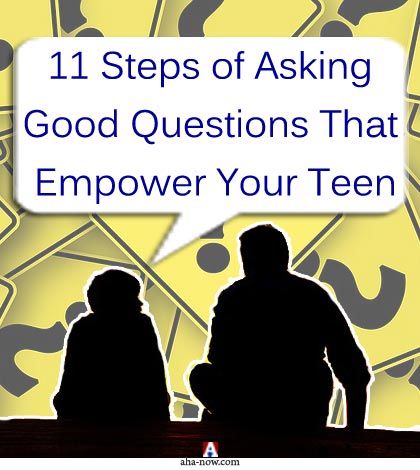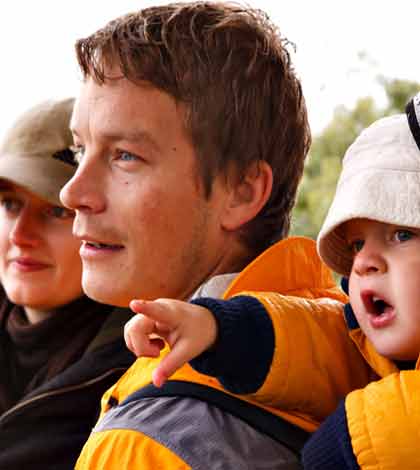11 Steps of Asking Good Questions That Empower Your Teen

Table of Contents
- 11 Steps for Asking Good Questions to Empower Teens
- 1. Notice the questions you ask yourself
- 2. Shift the Questions You Ask Yourself
- 3. Observe and Shift the Questions You Ask About Your Teenager
- 4. Begin Asking Your Teenager Positive Questions
- 5. Ask Open-Ended Questions
- 6. Ask Interesting Questions
- 7. Listen, Really Listen
- 8. Ask Follow-up Questions
- 9. Explain the Power of Questions to Your Teenager
- 10. Explain the Importance of the Questions We Ask Ourselves
- 11. Help Them Practice Asking Better Questions
- Summing Up
Imagine providing one tool that could help your teen make good choices, become more optimistic, notice more opportunities, and have a joyful mindset.
The tool of asking good questions can empower your teen toward all these and more!
Questions are powerful tools that guide our thoughts and our mindsets. Every decision we make is the result of a question.
Think about it. What you’re wearing results from “what should I wear?” Where you are working results from “where do I want to work?” or “where can I find a job?”
Good questions invite opportunity, while others cause heartache and pain.
Teenagers, and all of us, tend to ask themselves negative questions like: “what’s wrong with me?” “Why am I so different?” Or “why doesn’t anybody like me?”
The questions we tend to ask ourselves about other people tend to be: “why are they so mean?” “How could someone do something so awful?” Or “What’s wrong with that person?”
Teaching teenagers to ask more positive questions like, “What can I learn from this?” “What’s funny about what just happened?” or “What are my choices?” can set them up for a lifetime of joy and possibilities.
Helping teenagers notice the questions they ask and then change the questions they ask takes time, but the process can be empowering for the whole family!
“When you stop learning, stop listening, stop looking and asking questions, always new questions, then it is time to die.” ~ Lillian Smith
11 Steps for Asking Good Questions to Empower Teens
Here are 11 steps to begin asking the kinds of questions that empower your teenager. However, as Gandhi said, “be the change that you wish to see in the world,” the process begins with you as the parent and will not only empower your teenagers but also empower you!
1. Notice the questions you ask yourself
As a parent, you are under observation all the time. You’ve probably noticed your own phrases, gestures, and behaviors in your children.
The first step to helping them make a change is to begin making the change yourself. It’s difficult to teach someone how to do something that you haven’t tried already.
Pay attention to your own mental chatter. What kinds of questions are you asking yourself?
Are your questions focused on learning and growing? “What are the facts?” “What’s possible now?”
Or are your questions judgmental? “Why am I so stupid?” “How could I be such an idiot?”
You will probably notice more judgmental types of questions.
It’s okay! Most of us naturally ask these kinds of questions. Fortunately, we can learn to ask questions that serve us (and our teens) much better!
2. Shift the Questions You Ask Yourself
As you begin to notice the kinds of questions you ask yourself, celebrate the learning questions. Give yourself a mental “high five” whenever you notice these positive questions.
When you notice judging questions, do not berate yourself and go further down the road of negativity. Instead, ask “how else can I think about this?” and shift to a positive, learning question.
For example, imagine you are looking for your glasses and after searching the whole house, you find them on your head. Your mental question would likely be, “how could I be such an idiot?”
Notice that it’s a negative, judging question and shift to a better question, like “how can I share this in a way that will make someone laugh?”
3. Observe and Shift the Questions You Ask About Your Teenager
As you practice noticing and shifting the questions you ask yourself, you are primed to better notice the kinds of questions you ask about your teenagers.
Before teaching your teenagers about what you are learning and experiencing, it’s helpful to notice whether you are judgmental in your own thinking and questioning about them.
As parents, we love, adore and want the best for our children. Often this great desire breeds questions like, “how could my perfect boy do something so stupid?” and “how could she think that way?”
Again, you may be surprised by the judgmental and negative questions you notice yourself asking about your own child. It’s okay! Just like you were able to shift the questions you ask yourself, you can shift what you think about your teenager.
When you notice yourself thinking about your teenager, shift negative questions and ask positive ones.
For example, when your teenager makes a silly mistake, focus on questions like, “how can I respond in a way that helps her trust me?” “How can I help him learn from what happened?”
4. Begin Asking Your Teenager Positive Questions
Now that you have begun asking yourself learning questions and asking positive questions about your teenager, you are better prepared to ask your teenager good questions out loud.
When you find yourself in the middle of a negative question, stop talking, take a moment and try again with a positive question (You may notice this beginning to occur naturally as you shift what’s happening in your own head).
Imagine you find your teenager playing Call of Duty online with his buddies when he was supposed to be finishing his math homework. You find yourself saying, “what are you doing? Weren’t you supposed to be finishing your homework?”
Wherever you find yourself in those words when you remember they are coming out judgmental, stop. Say something more positive, like “Sorry, let me rephrase that… we agreed that you were going to finish your homework. Please turn that off. Would you like 2 minutes to say goodbye to your friends and exit?”
5. Ask Open-Ended Questions
Open-ended questions tend to be more positive and learning focused. Closed-ended questions invite a “yes” or “no” response and cut off the conversation.
As easy as it may sound, asking open-ended questions takes some thought. However, open-ended questions invite conversation and are worth the effort.
The best way to practice asking open-ended questions is to try to begin the sentence with “what” or “how.” Instead of “did you have a good day?” ask something like “what was the best part of your day today?”
Although questions beginning with “why” are open-ended, they often communicate judgment. When we ask, “why did you do that?” the conversation isn’t very inviting.
6. Ask Interesting Questions
Not all open-ended questions are interesting questions. The good news is that we can turn boring questions into interesting questions with a little thought.
Imagine asking your son, “if you could step into a time machine right now and relive one minute of your day, what would it be?” instead of “how was your day?”
Interesting questions take some time, but they engage teenagers and help you begin to understand their thinking and behavior better.
What does your teenager think about? What do they enjoy? If it’s Star Wars, what questions can you think of that incorporate lightsaber, the Force or Wookiees?
7. Listen, Really Listen
Teenagers make some messed up and embarrassing choices. It’s easy to ask judgmental questions and lecture our children.
However, judgments and lectures rarely inspire someone to get better. A better way to encourage and equip our teenagers toward maturity is to invite them into safe and interesting conversations.
Open-ended and interesting questions are the first step. Stopping and listening is next.
It will likely take a while for your teenager to open up if you are just beginning to practice using better questions. But as they begin to realize you are really listening, interested and safe, you may be surprised by what you learn.
8. Ask Follow-up Questions
Give your teenager time to speak. When you do speak, keep your comments brief and ask follow up questions.
Often we will want to correct something we hear as our teenager shares something with us. Instead of “lecturing” in that way, engage your childlike curiosity and listen. Then ask a follow-up question to hear more.
If they ask you a question, answer it briefly and don’t use it as a platform for teaching. It’s amazing how intelligent teenagers are.
As you ask more questions out of interest and curiosity, you are not only learning about your child. You are helping them filter through their thoughts and learn as well.
9. Explain the Power of Questions to Your Teenager
You may be amazed at the change in your teenager as you practice asking better questions. By changing ourselves, we model a better way, and the family experiences the results.
Additionally, we can share our experience and explain what we have learned about the power of questions, to invite the rest of our family to understand and practice good questioning as well.
Although teenagers often struggle with making good choices, they are smart and interested in learning. They will be especially interested when they see positive changes in you.
Take advantage of opportunities when they ask you why you’re asking a certain question to explain what you have learned about how questions guide our thoughts, choices and mindsets.
Ask them what they think about the idea and answer their questions. They may be really curious and ask more. If so, move on. If not, wait for another time to explain more.
10. Explain the Importance of the Questions We Ask Ourselves
It takes a while to fully understand and practice observing whether a question is judgmental or encourages learning and growth. So it may take a few different conversations to explain.
However, take advantage of opportunities of interest from your teen to explain the idea of positive questions and negative questions.
Positive questions encourage learning, growth, and possibility. Negative questions judge and constrict our thinking.
Take time to explain how negative questions can be caught and shifted to learning questions. Give examples of how powerful this is from your own experience and what you have learned.
11. Help Them Practice Asking Better Questions
Encourage your teenager to try asking better questions. Throw out some examples of judging questions and have her or him shift them to positive questions.
Challenge your teen to practice noticing and shifting the questions he or she asks himself or herself for a day and then ask them how it went.
Share your experiences with each other and laugh together. Enjoy learning something new with your teenager!
Summing Up
The art of asking great questions is a very powerful tool. By learning to ask ourselves, our teenagers and others better questions, we can experience more joy personally and inspire the whole family.
We can also give our children a life skill that empowers them for more optimism, possibilities, and joy in the future.
“The art and science of asking questions is the source of all knowledge.” ~ Thomas Berger
Over to You
What kind of questions do you ask yourself? How can you ask yourself questions that open up possibilities and encourage learning? What would it be like to ask your teenager questions that encourage conversation and growth? How will you start using the tool of asking great questions?
Disclaimer: Though the views expressed are of the author’s own, this article has been checked for its authenticity of information and resource links provided for a better and deeper understanding of the subject matter. However, you're suggested to make your diligent research and consult subject experts to decide what is best for you. If you spot any factual errors, spelling, or grammatical mistakes in the article, please report at [email protected]. Thanks.











Hey Jeff,
Emotion is our enemy when we’re trying to get through to our teen. We need to remind ourself that what he says and does is not a reflection on us. We may not like how he’s behaving or even how he’s thinking but keep our emotions out of it, even if his behavior impacts us. I’m not saying this is an easy thing to do it’s tough, but it’s a skill can learn just like any other.
We should ask our teen for his ideas and be collaborative. Let him see that we believe in him and that we’re not mad at him for struggling in his life. When we let him see that we have faith in his abilities and he has the space to work things out on his own, we will begin to develop true confidence in him. Our goal is to help our child think for them self, which will in turn help him feel like he has some control over his world. Listen openly to what he says and ask him to think critically about each choice.
If we attempt a conversation with our child and he’s rude or out of line, that’s when we have to hold on to ourself and make sure we don’t get dragged into a fight. If our relationship with child is such that it’s impossible to have an open, respectful conversation at this point in time, we should remember that it’s still our job to stay firmly planted. Eventually, thanks for sharing much interesting thought with us.
With best wishes,
Amar kumar
Hi Jeff,
Thanks for this insight into teens, though I may not be a parent yet I hope some day I will be that these tips will help in my parenting and help with my leadership in the home. These tips also go beyond teens and raising kids I believe. Some aspects can apply to other parts of life such as work life, volunteer work, faith based organizations etc… thank you for this article.
Hi Steven! I’m glad you see the benefits beyond parenting and don’t have to wait to be a parent to use them! I agree! Asking good questions is valuable for anyone!
Blessings on you as you practice!
being an auditor I ask different questions to my clients and sometime they hate me for this. Now onward I need to take care of your advices to open up possibliities and enhance my learning.
Let me know what you learn, Harish! I’m excited how it will work for auditing!
Hi Jeff
You are so right. The life of a Teen is adventurous and there is so much in life that makes them confused.
It is great that you teach parents to ask open-ended questions because this will help them teach their teens how to better perceive life.
Thanks for sharing this awesome post. Take Care.
You’re welcome, Ikechi! Thanks for the encouragement!
Hi Jeff,
Nice to see you here on AHAnow. When it comes to teens, I do think the most important thing on this list is “Listen” Really listen.. There are so many underlying things they will talk about that we can ask a question…like the open ended one.
It shows them why we ask questions because we care. Wonderful advice.
-Donna
Thanks Donna! I really like two things you said that are so important: listening and caring. Super important not only for teens but for everyone!
Hi Jeff,
This is a wonderfully helpful post for parents.
The most challenging phase of life for parents is teenage and the best way to stay connected with your teenagers is undoubtedly asking questions. If they are not answered promptly, that could be a red flag!
It is better to frame those questions smartly so that they don’t infringe their freedom or hurt the delicate emotions of adolescents.
Nice tips. Thanks for sharing.
Thanks Balroop! I’m so glad it’s helpful!
Hi Jeff,
That Lillian Smith quote sums it all up; if you ask questions and learn, life is exciting, enriching and fulfilling. If you neglect to question and to learn, life is not worth living at all.
We grow or die. We create or disintegrate. The questioning folks grow daily because they learn, keep their minds open and get the most out of life.
No teens – or kids – here but being around a few and living thru that stage myself I see why these questions empower teens. Hey, it’s an exciting but rough stage of our lives. Getting used to change, your new body, puberty, and all that wacky stuff. Handling this period of intense growth by asking the right questions to encourage deep thinking is a strengthening practice for these….younglings 😉
Thanks for sharing.
Ryan
Thanks Ryan! I love your summary of questioning folks growing, learning, keeping their minds open and getting the most out of life. I hope more “younglings” can learn this early on!
Hi Jeff, Great points, we do need to focus on listening with teenagers and remain positive. So often we want to talk rather than listen. After all, we have years’ more knowledge to impart and we’re running out of time with our children!
But listening is important, as is staying positive. We need to lift them up as they are full of self-doubt and may be subject to negativity from others.
I have twin daughters who are teenagers and I like to ask them about their friends. They often share with me some struggles that their friends may be going through. I then ask my girls what they think their friends should do.
Those questions give me insight about my girls and their friends. I can also see the judgment my girls have towards the problems their peers are facing.
It’s important to follow up later and ask how the friends are faring. Hopefully their on the upswing and doing better after facing their problems.
I love how you’re asking your daughters about their friends and then following up with asking what they think their friends should do! What a great idea! I can imagine that they learn a lot through this process and even ask you for advice without you having to offer it first.
Thanks for sharing!
Hi Jeff,
I really enjoyed reading this. I’m very lucky because I’ve always had a great relationship with my kids. Since they were little I’ve always encouraged them to talk about their day or how things went at school. Asking open ended questions most effective.
It made it easy for them to continue to do that when they were teens and now as young adults.
Thank you for sharing this. Have a great day and weekend.
Cori
Cori, thanks for your confirmation of some of the ideas working in your family! I’m excited that you have a great relationship with your kids and are able to communicate so well with them!
Hey Jeff and Harleena,
It’s kind of hard for me to think like that. But I have to take care of the questions I am going to ask in the upcoming time.
The main thing is that the shifting of the question to you. Think how would you react to the question when you were a teen?
It would bring a feeling which can let you lead towards the right thing.
Thanks for this wonderful article.
Hope you both are enjoying the time.
~Ravi
Hi Ravi,
I’m interested in what you mean by shifting of the question to you and thinking about how would you react to the question when you were a teen. Can you explain that more? It sounds very helpful, however, I think I may not be understanding exactly what you mean.
Thanks for your encouragement!
This is awesome advice, Jeff! I have two kids in their 20’s and I will use these tips. We talk on the phone more than the average because we are long distance. So, this really helps direct the conversation in a positive way. I could have used this advice years ago! Thank you.
I’m excited that you are able to use some of the ideas so practically with your family, Lisa! I’d love to hear how it goes!
Hi Jeff,
Although I try to pay attention to what I tell myself, it never crossed my mind to teach this critical lesson to our teens.
Teenager question themselves all the time.
I like the post because it teaches us parents that we can play a role in it.
The secret is how we present it and you couldn’t had laid it out any better my friend.
Listening will get you further than yelling. If we listen to them they’ll likely do the same.
Great post!
Thanks for your insightful and encouraging comments, Vernon! Listening is an amazing gift we can give!
Thanks for the opportunity to share these thoughts! I hope they encourage parents and families!